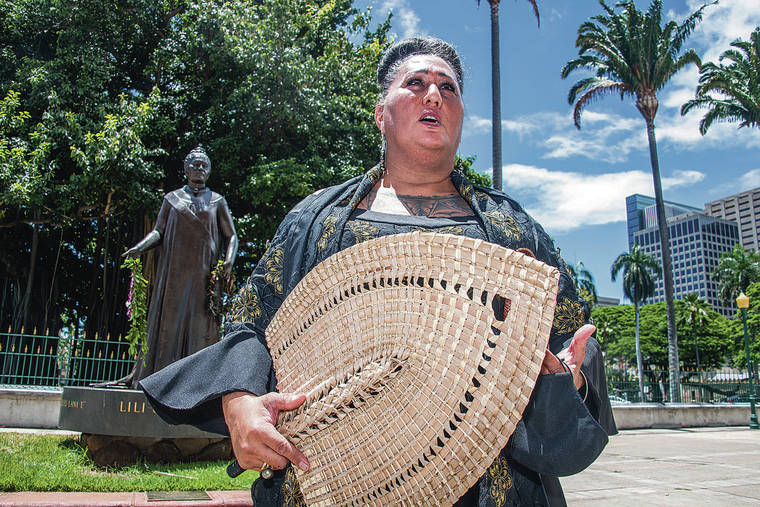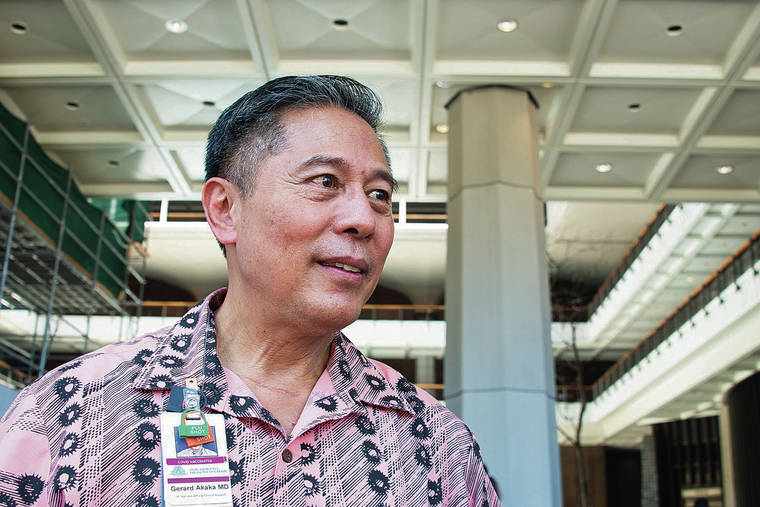Native Hawaiian leaders urge the lahui to help stop COVID-19 surge


CRAIG T. KOJIMA/CKOJIMA@STARADVERTISER.COM
Leaders from various sectors of the Native Hawaiian community, including Hinaleimoana Wong-Kalu, above, uniting to encourage community members to do their part to stop the surge of COVID-19.

CRAIG T. KOJIMA/CKOJIMA@STARADVERTISER.COM
Leaders from various sectors of the Native Hawaiian community, including Dr. Gerard Akaka, above, uniting to encourage community members to do their part to stop the surge of COVID-19.



A Native Hawaiian woman in her 40s wailed as a nurse pushed her in a wheelchair to the intensive care unit to say goodbye to her husband, who died of COVID-19 Opens in a new tab. Another Hawaiian couple, who traveled to Disney World with their children, both contracted the coronavirus, and upon returning home the husband was admitted to The Queen’s Medical Center and died. And when two daughters, who are Native Hawaiian, lost their mother to COVID-19, they spoke to her nurse, expressing sadness, devastation and guilt.
These are just a few of the countless stories that Dr. Gerard Akaka said he has seen and heard at The Queen’s Health Systems. As vice president of Native Hawaiian Affairs and Clinical Support at Queen’s, Akaka said he doesn’t want history to repeat itself.
“Back in the 1880s the Hawaiians were devastated by a series of epidemics, which prompted King Kamehameha IV to say that ‘we must stay the wasting hand that is destroying our people,’” Akaka said. “As we fast-forward to today, we’ve been in the COVID pandemic for 18 months. This surge (of the delta variant) is for real.”
Akaka joined more than 20 Native Hawaiian leaders — kumu hula, educators, health care professionals, public officials and politicians — at a news conference Thursday at the state Capitol to urge their lahui (nation) to help stop the surge of COVID-19 cases by wearing masks, maintaining physical distancing and getting vaccinated.
Others in attendance included former Gov. John Waihee; Joseph Keawe‘aimoku Kaholokula, chairman of Native Hawaiian Health at the John A. Burns School of Medicine; Office of Hawaiian Affairs Board of Trustees Chairwoman Carmen Hulu Lindsey; kumu hula Vicky Holt Takamine and Mapuana de Silva; Hailama Farden, president of the Association of Hawaiian Civic Clubs; Mehanaokala Hind, senior vice president of community programs at the Council for Native Hawaiian Advancement; U.S. Rep. Kai Kahele; state Sens. Jarrett Keohokalole and Kurt Fevella; and state Reps. Daniel Holt and Stacelynn Eli. Kumu Hinaleimoana Wong-Kalu ended the event with an oli that called for the longevity and health of the lahui.
According to the state Department of Health, more than 8,600 Native Hawaiians have tested positive for COVID-19.
Don't miss out on what's happening!
Stay in touch with breaking news, as it happens, conveniently in your email inbox. It's FREE!
Since the beginning of the pandemic, more than 500 Native Hawaiians have been hospitalized, representing the third-largest share among the state’s ethnic groups, and about 75 have died. A state Department of Health survey, released in June, also confirmed disparities among ethnic groups. While 71% of Japanese and 68% of Caucasian respondents were more likely to be fully vaccinated, those numbers dropped to 49% for Native Hawaiians.
Diane Paloma, CEO of the King Lunalilo Trust and Home, said that because the consequences of the pandemic are devastating, all of her staff and kupuna residents have been vaccinated. She pointed to the tough decisions the alii made in protecting the Native Hawaiian community years ago as examples of what to do.
“It is my sincere hope that the generations who come long after us know that we did everything possible to remain standing as a lahui,” she said. “The gifts and legacies that our alii have left us have helped to uplift our lahui in so many ways. And now it is our chance to malama that and ensure a bright future for those who come centuries after us.”
Kalehua Krug, principal of Ka Waihona o ka Na‘auao Public Charter School in Nanakuli, added that he chooses current science because “our people were innovative and utilized many principles of science to build our indigenous world.”
“Our community is at a crossroads. One road is guided by our negative perspectives and experiences and the distrust of science and scientists, government and big pharmaceutical companies. The other road is guided by health care and current mainstream medical information. Both roads have valid concerns and are so deep and fraught with nooks and crannies that it has certainly become a … maze for many to get lost in,” Krug said. “We encourage our students to embrace education as important. We have guided them to kulia (strive) and become doctors, nurses, lawyers and such, if they choose. After all of that encouragement and all of their hard work to get there, we seemingly have turned our backs on our Native Hawaiian doctors. They are our modern-day healers. No more lives are worth losing, especially those of our lahui.”
———
Jayna Omaye covers ethnic and cultural affairs and is a corps member of Report for America, a national service organization that places journalists in local newsrooms to report on undercovered issues and communities.





